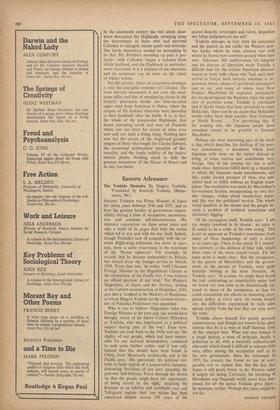Eastern Adenauer
SHIGERLI YOSHIDA was Prime Minister of Japan for seven years between 1946 and 1955, and so bore the greatest burden of government respon- sibility during a time of occupation, reconstruc- tion and eventual self-determination. His memoirs concentrate on these seven years and only a tenth of its pages deal with the events which led to war and with the war itself. Indeed, though Yoshida's lack of sympathy with the ex- treme Right-wing militarists was never in ques- tion, there is some evasiveness in his treatment of the `Showa upheaval.' For example, he records that he became ambassador to Britain, but retired from the foreign service in March, 1939. `From that time,' he writes, `until I became Foreign Minister in the Higashikuni Cabinet at the termination of the Pacific war, I was without an official position of any kind.' Yet Mamoru Shigemitsu, in Japan and her Destiny, writing of the Cabinet reconstruction of December, 1944, says that it `stopped at the Ministry of Munitions, to which Shigeru Yoshida (at the moment Gover- nor of Fukuoka Prefecture) was appointed.'
Who is one to believe—Shigemitsu (who was Foreign Minister at the time and, one would have thought, aware of his fellow Cabinet Ministers) or Yoshida, who was imprisoned as a political suspect during part of the war? Even now, Yoshida can look back to the 1930s and say `the vitality of our people, which had been respon- sible for our national development, continued to seek some further outlet—and it was only natural that this should have been found in China, from Manchuria southwards, and in the Pacific area.' His patriotism, his political out- look, is fairly typical of a conservative Japanese, distrusting Socialism of any sort, parading the post-war Self-Defence Force through the streets `so that the people might have the opportunity of being stirred by the sight,' despising the Koreans as an inferior and unreliable race and Tokugawa regime—that `our nation has been convinced—despite almost 200 years of the spared despotic sovereigns and rulers, despotism not being indigenous to our soil.'
Yoshida emerges, in fact, both the statesman and the patriot, as not unlike the Western post- war leader whom he most admires and with whom he found most common ground when they met: Adenauer. His stubbornness, his integrity and his distrust of liberalism made Yoshida a difficult man for the civilian American adminis- trators to work with—those who 'had, until their arrival in Tokyo, been lawyers, salesmen in de- partment stores, editors of provincial newspapers and so on,' and many of whom were New Dealers. MacArthur he respected, particularly for his stand against the Russians when the ques- tion of partition arose. Yoshida is convinced that if Soviet forces had been permitted to enter Hokkaido, `there can be no doubt that Hokkaido would today have been another East Germany or North Korea. . . . For preventipg this, if for nothing else, the Japanese people have abundant reason to be grateful to General MacArthur,'
Perhaps the most interesting part of the book is that which describes the drafting of the post- war constitution, a document which most Japanese with views on the matter distrust as being, in some curious and undefinable way, foreign. One of the reasons for this is now made clear. American GHQ drew up a blueprint to which the Japanese made amendments; and this, under forced pressure of time, was sub- mitted back to GHQ without an English trans- lation. The translation was made by MacArthur's Government Section, incorporating its own fur- ther changes, within about twenty-four hours, and this was the published version. The whole vexed question of the throne and the people be- came a problem of textbook translation and dictionary digging.
Of the occupation itself, Yoshida says: '1 am too deeply involved in its drama : an actor is ill suited to be a critic of his own acting.' This is not as apparent as Yoshida's remoteness from many of these happenings of only a dozen or so years ago. There is too much 'if I remem- ber correctly at this distance of time' talk, which blurs some of the more crucial events. Yet the main point is made clear: that the occupation, in the person of MacArthur, and the govern- ment, in the person of Yoshida, were quite honestly striving in the same direction. As Yoshida says : 'In a sense, we might have found the task confronting us considerably easier had we found our own aims to be diametrically op- posed to those of the occupation, so that we could concentrate our efforts on thwarting occu- pation policy at every turn. As events turned out, the difficulties experienced by both sides sprang mainly from the fact that our aims were the same.'
Yoshida allows himself few purely personal reminiscences, and though one knows from other sources that he is a man of bluff humour, little of this emerges here. What one sees instead is a tough patriot, a man of principle, hardly a politician at all, with a naturally authoritarian character which found it difficult to tolerate little men, either among the occupation staff or in his own government. Since his retirement in 1955, his country has found no one of com- parable size to replace him. But the fact that Japan is still pretty firmly in the Western camP is largely his doing. Curiously, the bombing of Hiroshima and Nagasaki might never have han- pened, for all the notice Yoshida gives them: he mentions neither, Perhaps this takes solidaritY too far.
ANTHONY THWATIE


































 Previous page
Previous page